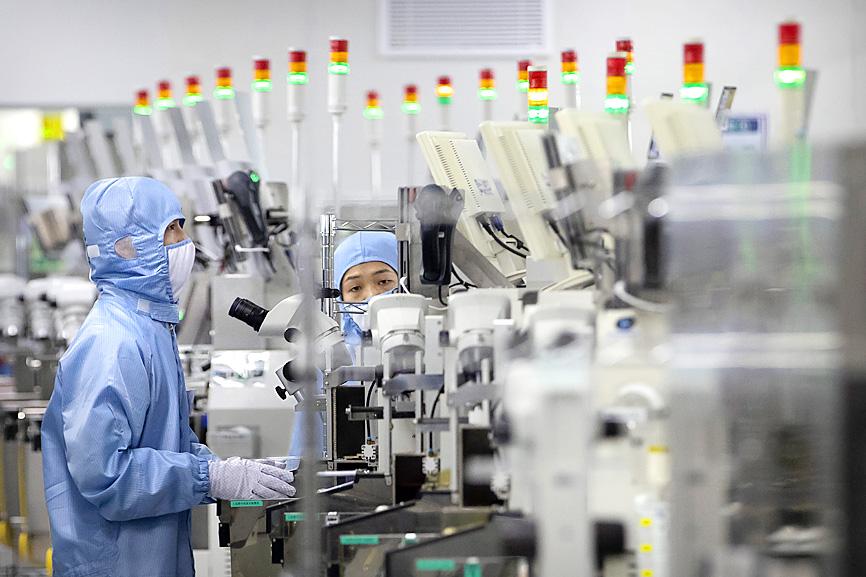China yesterday announced tax breaks to spur growth of its semiconductor industry following US sanctions that alarmed the Chinese Communist Party by cutting off access to US processor chips for tech giant Huawei Technologies Co (華為) and some other companies.
Leaders declared accelerating efforts to transform China into a self-reliant “technology power” to be this year’s top economic priority after the tariff dispute with Washington highlighted its reliance on US components for smartphones and other industries Beijing wants to develop.
Chipmakers can import machinery and raw materials tax-free through 2030, the Chinese ministry of Finance and other agencies announced.

Photo: AP
It did not say how large a subsidy to manufacturers that might represent.
Beijing has spent heavily over the past two decades to build up a Chinese chip industry, but its makers of smartphones and other technology still rely on Taiwan, Europe and the US for their most advanced components.
Then-US president Donald Trump cut off Huawei’s access to US processor chips and other technology in 2019 in a fight over Beijing’s industrial ambitions.
Last year, Trump tightened curbs by prohibiting global suppliers from using US technology to make chips for Huawei. That threatens to cripple the firm’s smartphone business, which was the No. 1 global seller early last year, but has dropped out of the top five brands.
Political analysts expect little change in position under US President Joe Biden.
Huawei founder and chief executive officer Ren Zhengfei (任正非) said in February that it is “very unlikely” sanctions will be lifted.
Processor chips and other semiconductors are China’s biggest single import, totaling more than US$300 billion a year.
Under the latest measure, machinery and raw materials “that cannot be produced or whose performance cannot meet demand” would be exempt from import tax, the government said.
That applies to photoresists, masks, polishing pads and liquids, silicon crystals and wafers, materials to build clean rooms and other production equipment, it said.

South Korea’s equity benchmark yesterday crossed a new milestone just a month after surpassing the once-unthinkable 5,000 mark as surging global memory demand powers the country’s biggest chipmakers. The KOSPI advanced as much as 2.6 percent to a record 6,123, with Samsung Electronics Co and SK Hynix Inc each gaining more than 2 percent. With the benchmark now up 45 percent this year, South Korea’s stock market capitalization has also moved past France’s, following last month’s overtaking of Germany’s. Long overlooked by foreign funds, despite being undervalued, South Korean stocks have now emerged as clear winners in the global market. The so-called “artificial intelligence

‘SEISMIC SHIFT’: The researcher forecast there would be about 1.1 billion mobile shipments this year, down from 1.26 billion the prior year and erasing years of gains The global smartphone market is expected to contract 12.9 percent this year due to the unprecedented memorychip shortage, marking “a crisis like no other,” researcher International Data Corp (IDC) said. The new forecast, a dramatic revision down from earlier estimates, gives the latest accounting of the ongoing memory crunch that is affecting every corner of the electronics industry. The demand for advanced memory to power artificial intelligence (AI) tasks has drained global supply until well into next year and jeopardizes the business model of many smartphone makers. IDC forecast about 1.1 billion mobile shipments this year, down from 1.26 billion the prior

NEW IDENTITY: Known for its software, India has expanded into hardware, with its semiconductor industry growing from US$38bn in 2023 to US$45bn to US$50bn India on Saturday inaugurated its first semiconductor assembly and test facility, a milestone in the government’s push to reduce dependence on foreign chipmakers and stake a claim in a sector dominated by China. Indian Prime Minister Narendra Modi opened US firm Micron Technology Inc’s semiconductor assembly, test and packaging unit in his home state of Gujarat, hailing the “dawn of a new era” for India’s technology ambitions. “When young Indians look back in the future, they will see this decade as the turning point in our tech future,” Modi told the event, which was broadcast on his YouTube channel. The plant would convert

People stand in a Pokemon store in Tokyo on Thursday. One of the world highest-grossing franchises is celebrated its 30th anniversary yesterday.